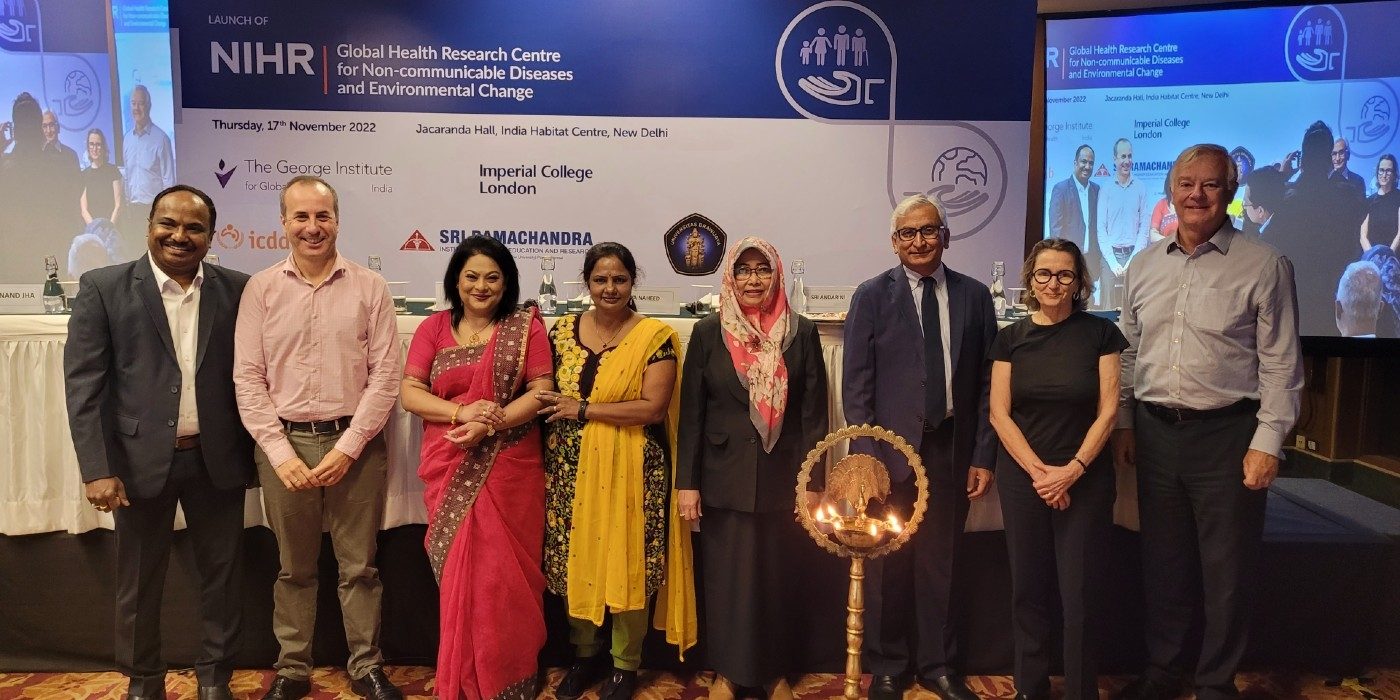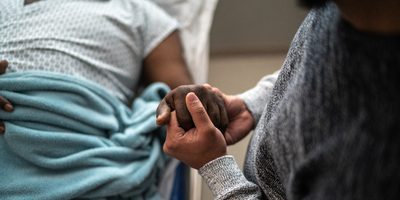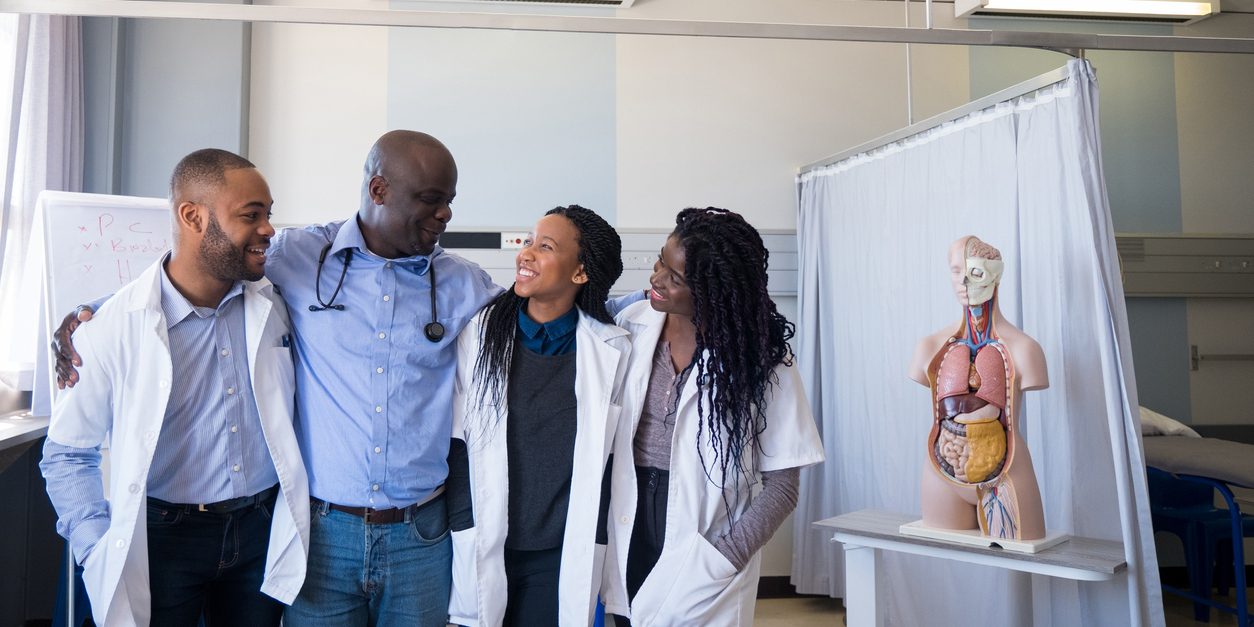A £10m grant has established the NIHR Global Health Research Centre on Non-Communicable Diseases and Environmental Change.
The Centre, a partnership led by Imperial College London and The George Institute India, will work to tackle the dual challenge of a rapidly growing burden of non-communicable diseases (NCDs) and global environmental change in low- and middle-income countries (LMICs).
LMICs face unique challenges in delivering equitable, high-quality primary care services for the prevention and treatment of NCDs such as diabetes, kidney disease, hypertension and cardiovascular disease, and mental health. This is especially true among marginalised populations that are affected by - or have migrated due to - environmental risks and exposures including air pollution, flooding, and heatwaves. The Centre will focus on populations in Bangladesh, Indonesia and India which are amongst the most vulnerable to the impact of climate change on health.

From left to right - Dr D Praveen, Program Director, The George Institute India, Prof Christopher Millett, Professor of public health, Imperial College London, Dr Aliya Naheed, Prof Vidhya Venugopal, Prof Dr Sri Andarini, Prof Vivekananda Jha, Dr Robyn Norton, Mr David Armstrong
Despite increased recognition of the need for action there is limited evidence on cost-effective interventions to address the major challenges emerging at the intersection of NCDs and environmental change in LMICs.
Professor Vivekanand Jha, co-lead of the Centre and Executive Director of The George Institute India remarked: “LMICs face dual, intertwined challenges of a rapidly growing burden of NCDs and the existential threat of global environmental change. Our Centre will focus on three major challenges at the interface of NCDs and environmental change - air pollution, water salinity and food systems and generate actionable evidence for improving health outcomes and reducing inequities in a cost-effective manner”.
The National Institute for Health and Care Research (NIHR) Global Health Research Centre for NCDs and Environmental Change includes an interdisciplinary group of academics from the International Centre for Diarrhoeal Research (Bangladesh), Sri Ramachandra Institute of Higher Education & Research (India), and University of Brawijaya (Indonesia), who will work to address specific health concerns related to environmental change.
Community focused
Research priorities have been developed with the focus communities, with empowerment, engagement and outreach at the heart of the Centre’s research programme which will see local populations and primary health care professionals actively involved in the design, implementation and evaluation of interventions
“The Centre will allow participating institutions to develop their capacity to deliver the high quality, trans-disciplinary research that policy makers and communities need to reduce the impact of climate change on health in our focus countries and beyond”, said Professor Christopher Millett, co-lead of the Centre and Professor of Public Health at Imperial College London.
Water salinity in Bangladesh
In Bangladesh storm surges caused by tropical cyclones have led to an increase in water salinity across the coastal belt. This has harmful health effects on local populations, including increased blood pressure, progressive kidney disease and gestational hypertension in pregnant women.
The International Centre for Diarrhoeal Disease Research Bangladesh (icddr,b) will work to identify and test cost-effective, sustainable solutions to reduce salinity in the water supply in the districts of Khulna and Satkhira.
Plastic burning in Indonesia
The unregulated burning of plastic waste in Indonesia releases harmful chemicals, such as dioxins, which pollute the environment and lead to negative health outcomes including chronic lung disease, heart diseases, and cancers.
Researchers will test a range of multi-sectoral interventions to reduce exposure to air pollutants caused by the burning of plastic waste in Malang district, East Java, targeting cardiovascular disease and chronic obstructive pulmonary disease.
Improving dietary diversity in India
The Public Distribution System in India provides 800 million individuals on a low-income with food aid, which mainly consists of wheat and rice. Some states have experimented with adding pulses, fresh fruit and vegetables, oils, and iodised salt but this diversification has not been evaluated. The Centre’s work will include the implementation and evaluation of cost-effective, sustainable changes to food aid baskets in the states of Chhattisgarh and Andhra Pradesh. These changes aim to improve dietary diversity for NCD prevention, targeting diabetes and cardiovascular disease.
Enhancing research capacity
A key aspect of the Centre’s programme of work over the five years will be to address the urgent need to build research capacity to enable identification of effective strategies and interventions within local communities. The team will deliver a number of capacity building activities for researchers at different stages of their careers from different institutions and the wider community.
“Evidence generation for effective policies needs skilled researchers, an enabling research environment within institutions, empowered communities and conducive ecosystems. This is what the Centre aims to achieve with a strategy developed in a consultative manner,”said Dr Niveditha Devasenapathy, Lead, Better Treatments at The George Institute India.
The research programme will also empower communities, local populations and primary health care professionals who will be actively involved in the design, implementation, and evaluation of interventions. In addition, frontline health workers and communities will be involved in delivery of dual benefit interventions – for example The Woman Farmer Empowerment Scheme, which aims to sustain agriculture-based livelihoods, will be integral to the food aid intervention in India. Staff from the Centre will train groups of community members to use surveillance data to be collected for evaluation, advocacy, and accountability purposes.
NIHR Global Health Research Centres
The £10m funding will cover a five-year period from October 2022. The NIHR funds, enables and delivers world-leading health and social care research that improves people's health and wellbeing and promotes economic growth. NIHR Global Health Research Centres are partnerships between institutions in LMICs and those in the UK that undertake research on NCDs. The Centres are part of the NIHR’s commitment to investing in global health research in developing countries that are eligible to receive Official Development Assistance from the UK aid budget.
Professor Faith Osier, Chair of the NIHR Global Health Research Centres Funding Committee, said: “These new Centres are truly ground-breaking – it’s the first time we’ve seen anything like this level of investment in non-communicable disease research in low- and middle-income countries. The potential for this truly equitable partnership working between researchers in LMICs and in the UK is immense and we’re so excited to see the advances that the next five years will bring.”
A launch event for the NIHR Global Health Research Centre on Environment Change and NCDs will take place on Thursday, 17 November 2022 in New Delhi. It will feature presentations by the NIHR, policy talks, multi-sectoral panel discussions and research presentations, bringing together researchers, funders, community representatives, public health practitioners, policymakers and thought leaders to hear about the Centre’s mission.








































